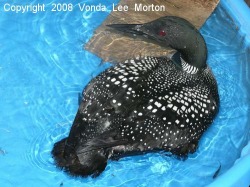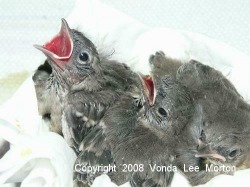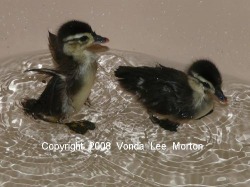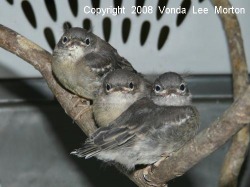
Last week I hosted a most unusual - for Georgia - guest when a migrating common loon apparently crash-landed on a paved road, mistaking it for water. He had some mild bruising to his right foot but was otherwise uninjured. Dr. Shelley Baumann, one of my wonderful vets at Smalley’s, agreed with my decision to keep him a day or two to make sure we hadn’t missed anything. He was a healthy fellow, though, so I was able to release him two days after he came in.
This is one of the many things that makes wildlife rehab so interesting: with each new species I receive, I learn more and more about the vast variety of critters that inhabit our world. Who knew loons have solid bones, rather than the typical hollow bones of most birds? And their feet are positioned so far back on their bodies that they’re the most awkward-looking things you’ve ever seen on land...in the water, though, they’re elegantly graceful. And in full breeding plumage, as this guest was, they’re absolutely gorgeous birds, too.

Feather season has kicked in, obviously! At the moment, I have three blue-gray gnatcatchers and two wood ducklings, in addition to the last of "first fur season": three gray squirrels and a flying squirrel. The flyer is good to go; she just has to decide to leave. The grays have about two weeks left before they’re releasable, and even though I just got the gnatcatchers in last week, they’ve already fledged - means they’re perching and flying short distances but not eating on their own yet.

The wood ducks will be with me for several months while I pamper and spoil ‘em rotten. Wood ducks are stressy little darlings and while they hatch self-feeding, there are so many other little details to their care that they can be quite time-consuming. They’re adorable, though!
Just a reminder now that feather season has arrived: it is a violation of federal law to disturb nests containing eggs or young. The Migratory Bird Treaty Act (MBTA) protects every avian species in the US except pigeons, starlings and house sparrows. If you have trees that need pruning, check first for nests so that you don’t end up breaking federal law, and pass this tip along to other landowners, businesses or local government officials who might not know it. I found out this week that while our local officials may comply with the EPD, they were not aware that disturbing nesting birds could bring the feds down on them hard. They know now; whether it will make a difference remains to be seen. I’m not hopeful, quite frankly, as we seem to live in a "growth at all costs" world, where the environmental impacts of our actions are counted insignificant as long as no humans are inconvenienced...
Folks, if you take nothing else away after visiting this site, please, PLEASE leave with the knowledge that human actions can make a HUGE impact on wildlife. It’s not that humans are necessarily the superior species - I’ll argue against that notion any day - it’s just that we’ve discovered a myriad of ways to kill fellow humans while wrecking the environment, too. Humans DO, however, possess the means to protect our wildlife and its habitat, and until more of you start making noise about the wanton destruction of habitat and the uncaring attitude of our leaders at the local, state and national levels toward the plight of local wildlife, nothing will change.
Okay, rant over for this week. I’ll hop off my soapbox now!

 RSS Feed
RSS Feed
